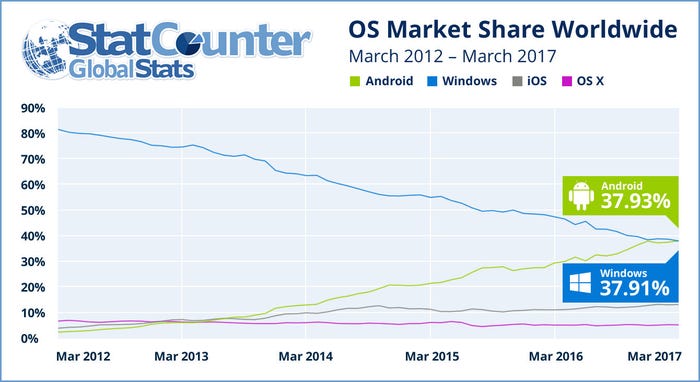Google tries to bring peace to the Android galaxy
The owner of Android has created a patent-pooling scheme with the stated aim of ending patent litigation between Android OEMs.
April 4, 2017

The owner of Android has created a patent-pooling scheme with the stated aim of ending patent litigation between Android OEMs.
To encapsulate that aim Google has named the group Pax – Latin for peace – and has recruited Samsung, LG, HTC, Foxconn, Coolpad, BQ, HMD, and Allview to the cause. Those members collectively own 230,000 patents and that suggests an possible underlying motive behind the move – to protect members from external patent litigation threats.
“Under Pax, members grant each other royalty-free patent licenses covering Android and Google Applications on qualified devices,” blogged Jamie Rosenberg, VP of Business and Operations for Android and Google Play. “This community-driven clearinghouse, developed together with our Android partners, ensures that innovation and consumer choice – not patent threats – will continue to be key drivers of our Android ecosystem.”
Among the many conspicuous absentees from the founding list is Microsoft, which due to patents it owns is able to collect royalties on every Android phone sold. Another company unlikely to join the party is Oracle, which has been in litigation with Google over the use of Java in Android for years.
Incidentally StatCounter reckons Android has overtaken Windows as the most popular OS regardless of device, in terms of internet usage market share (see chart). “This is a milestone in technology history and the end of an era,” said Aodhan Cullen, CEO of StatCounter. “It marks the end of Microsoft’s leadership worldwide of the OS market which it has held since the 1980s. It also represents a major breakthrough for Android which held just 2.4% of global internet usage share only five years ago.”
Patent litigation has been a standard part of the business armoury in the tech sector for years, with Android’s only competitor Apple looking especially trigger-happy in that respect at the moment. Often it simply comes down to who has the greater number of patents, so pooling systems such as this make sense as a defensive move.

About the Author
You May Also Like










.png?width=300&auto=webp&quality=80&disable=upscale)


_1.jpg?width=300&auto=webp&quality=80&disable=upscale)